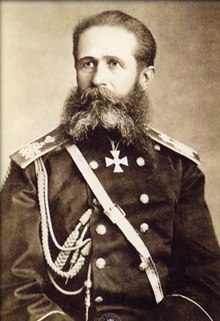Josef Wladimirowitsch Gurko
Iosif Gurko ( Russian Иосиф Владимирович Гурко * July 16 . Jul / 28. July 1828 greg. , † January 15 . Jul / 28. January 1901 . Greg near Tver ) was a general of the Russian army .
Military career
Gurko was born the son of a general and raised in the page corps . In 1846 he joined the Guard Hussar Regiment as a cornet and in 1852 was promoted to captain in the line infantry . He then took part in the Crimean War in the Diebitsch regiment . In 1857 Gurko returned to the Guard Hussar Regiment as chief of a squadron . It was in 1860 adjutant of Tsar Alexander in 1861 for Colonel promoted.
In 1863 he went to the Polish part of Russia, where he played an outstanding role in the suppression of the January uprising . In 1866 he was appointed commander of a hussar regiment and in 1867 major general and commander of the bodyguard hussar regiment on horseback. In 1873 he rose to the command of a cavalry guards brigade and in 1875 received the rank of division commander.
Russo-Turkish War

When the Russo-Turkish War broke out in 1877 ( Balkan Crisis ), he was given command of a special corps composed mainly of cavalry , with which he crossed the Balkan Mountains near Tarnowo in July , took the Shipka Pass and Stara Sagora and advanced to Adrianople with the exception of two days' marches . As a result, he had to retreat across the Balkans from Suleyman Pasha's army . In October Gurko received the command of the entire Guards and the cavalry of the Western Army with the order, the lines of communication of at Pleven standing (Plevna) Turkish army under Osman Pasha to complete to interrupt and its enclosure. Gurko achieved this by storming the entrenched Gorni Dubnik on October 24th and by shelling the village of Telisch to hand it over on October 28th. Thereupon he crossed the Balkans again in December and occupied Sofia on January 4, 1878 , defeated the siege army on the Shipka Pass together with the troops under General Radezki and marched from there to Philippopolis ( Plovdiv ), where he participated in the three-day battle at Philippopolis (from 15 . to January 17) the army of Suleyman Pasha dispersed. On January 20, the Russian troops reached Adrianople ( Edirne ), whereupon the armistice was concluded.
Governor General and assassinations of the Tsar
After the war ended, Gurko was promoted to general of the cavalry and adjutant general of the Tsar. On April 14, 1879, he was appointed Governor General of Saint Petersburg with extensive powers . However, since Gurko could not prevent the attacks on the life of the Tsar during the next winter, he was relieved of his position in 1880 and relieved of any further military service. It was not until Alexander III. called him back to active service and made him governor-general of Odessa in 1882 and that of Warsaw in Vistula (Poland) in 1883 , where he served until 1894.
From 1886 he was a member of the State Council . On March 29, 1888, he was appointed Commander-in-Chief of the Army on the Western Front and Governor General of Poland . On January 14, 1892, he was recalled from this post as a peaceful gesture towards Germany.
In December 1894 Gurko was dismissed and appointed General Field Marshal due to illness .
Josef Gurko died on January 15th July. / January 28, 1901 greg. on his Sakharovo estate near Tver .
family
In 1861 he married Countess Maria Salias de Tournemir (1842-1906), eldest daughter of the writer Yevgenia Tur (1815-1892). In 1884 Maria Andreevna was awarded the Order of Saint Catherine. The happy marriage has several children:
- Vladimir (1862-1927)
- Wassili (1864–1937)
- Yevgeny (1866-1891)
- Dmitri (1872-1945)
- Nikolai (1874–1901)
- Alexei (1880-1889)
literature
- Hinze: Gurko and Suleiman Pascha . Berlin (1880)
- General Gurko . In: The Gazebo . Issue 9, 1878, pp. 158 ( full text [ Wikisource ]).
Web links
Individual evidence
| personal data | |
|---|---|
| SURNAME | Gurko, Josef Wladimirowitsch |
| BRIEF DESCRIPTION | Russian general |
| DATE OF BIRTH | July 28, 1828 |
| DATE OF DEATH | January 28, 1901 |
| Place of death | at Tver |
